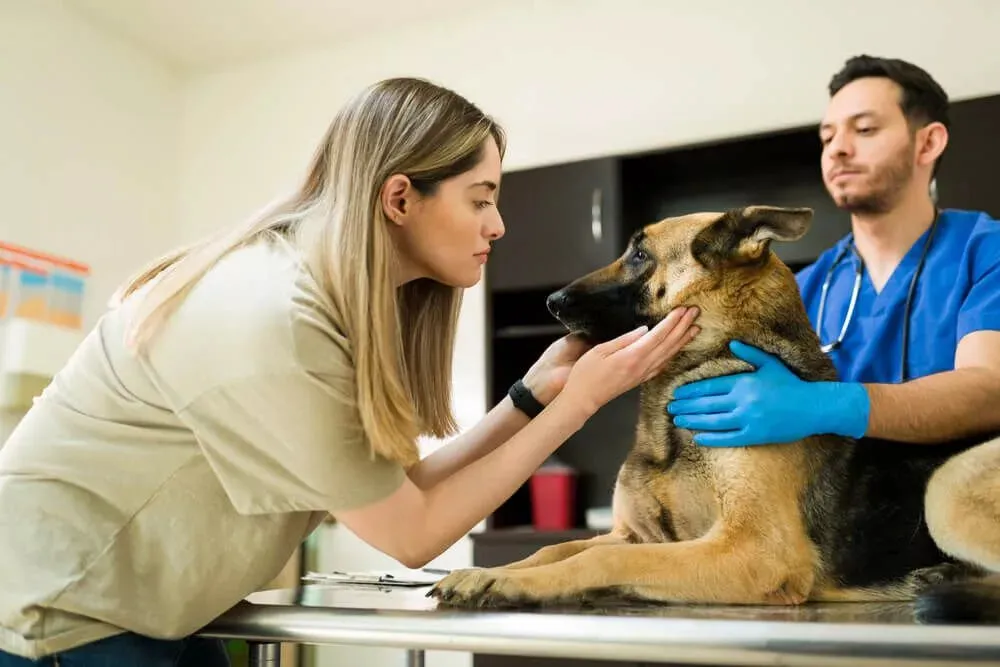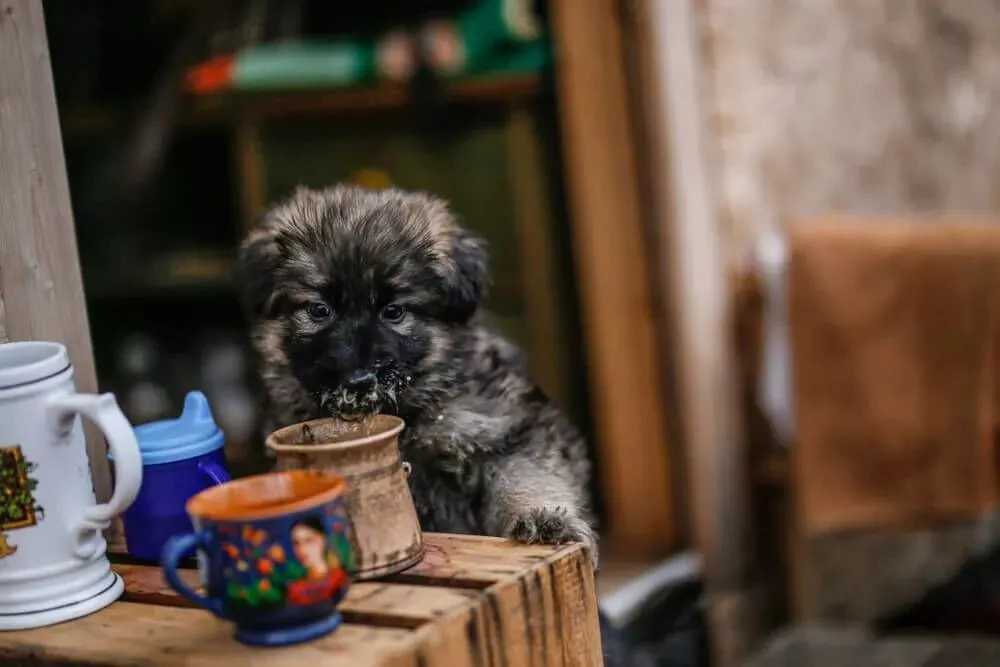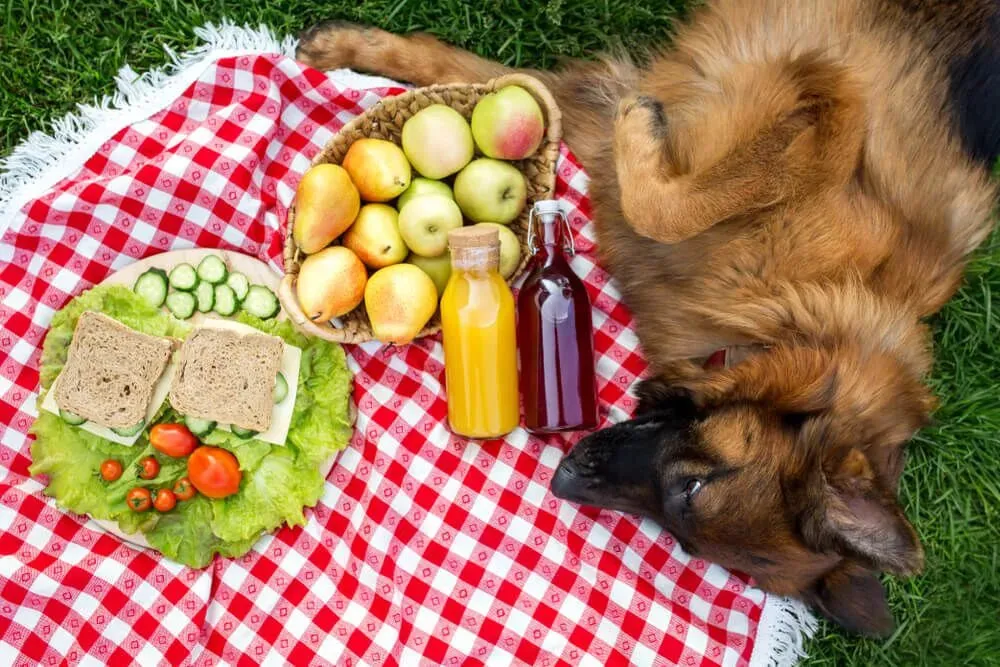Variety may be the spice of life for humans, but when it comes to our beloved German Shepherds, a diverse diet needs careful consideration. While you might enjoy exploring new flavors, many foods that are perfectly safe for people can be highly toxic or cause severe digestive upset in dogs. As responsible German Shepherd owners, understanding “What Foods Can German Shepherds Not Eat” is crucial to prevent accidental ingestions, which are a common reason dogs end up in emergency veterinary clinics. This guide will help you navigate the dangerous world of human foods to keep your loyal companion safe and healthy. Providing your German Shepherd with a well-balanced diet ensures they thrive, but it’s equally important to know the boundaries to protect their well-being. If you’re ever unsure about a new food, it’s always best to consult your veterinarian. For a broader overview of their diet, you might also be interested in what can german shepherds eat and not eat.
Recognizing the Signs of Food Toxicity in German Shepherds
Accidental ingestion of toxic foods is a serious concern. Knowing the signs of food toxicity can help you react quickly and potentially save your German Shepherd’s life. If you suspect your dog has eaten something harmful, immediate veterinary advice is paramount.
 A concerned German Shepherd dog looking at its owner, indicating illness
A concerned German Shepherd dog looking at its owner, indicating illness
Common signs of food toxicity in dogs include:
- Vomiting
- Diarrhea
- Lethargy or unusual tiredness
- Tremors or seizures
- Ataxia (wobbly, uncoordinated movements)
- Increased thirst or urination
As soon as you realize your German Shepherd has ingested a potentially toxic substance, contact a veterinarian immediately. Emergency helplines, such as the Pet Poisons Helpline, can offer guidance on whether the ingested item is toxic, what symptoms to monitor, and the necessary next steps. Depending on the situation, your vet may advise you to induce vomiting or may recommend urgent clinic treatment.
Toxic Foods to Absolutely Avoid for German Shepherds
A toxic food is one that can cause significant internal organ damage or even be fatal if consumed. These items should never be given to your German Shepherd, even in small amounts. Understanding what fruits can dog not have is also vital, as many seemingly harmless fruits can be highly dangerous.
Alcohol
Alcohol toxicity in German Shepherds can manifest as vomiting, diarrhea, uncoordinated movements, excessive salivation, and increased thirst. In severe cases, alcohol can lead to liver damage, similar to its effects on humans. During parties or gatherings, it’s crucial to keep alcoholic beverages out of your dog’s reach. An unattended glass of wine or beer could quickly become a health hazard for your furry friend.
Garlic, Chives, and Onions
All forms of garlic, onions, and chives—whether raw, cooked, or powdered—are members of the Allium family and are toxic to dogs. They cause toxicity by damaging red blood cells, which can impair oxygen-carrying capacity and lead to hemolytic anemia. Ingestion also commonly results in inflammation of the stomach and intestines, leading to symptoms like vomiting, nausea, and acid reflux. These are frequent ingredients in human cooking, so always check food labels thoroughly before sharing any leftovers with your German Shepherd.
Xylitol
Xylitol is an artificial sweetener found in numerous common household products, including baked goods, candies, some peanut butters, toothpaste, and chewing gum. Ingestion of xylitol causes a rapid and severe drop in a dog’s blood sugar levels (hypoglycemia), which can lead to profound weakness, collapse, and even seizures. Always check ingredient lists for xylitol before sharing any human foods or products with your dog.
Caffeine
Caffeine is a neurological stimulant found in teas, coffees, energy drinks, and chocolate. In German Shepherds, caffeine can increase heart rate, cause restlessness or hyperactivity, vomiting, and diarrhea. Large amounts of caffeine can lead to liver damage if not treated promptly. Keep all caffeinated products securely stored away from your curious canine.
 A worried German Shepherd looking at a coffee cup on a table, signifying a forbidden item
A worried German Shepherd looking at a coffee cup on a table, signifying a forbidden item
Grapes, Raisins, and Sultanas
The exact mechanism by which grapes, raisins, and sultanas cause toxicity remains unknown, but it is well-established that they can cause permanent and irreversible kidney damage, which may not become evident until it’s too late. In extreme cases, ingestion can be fatal. There is also no known toxic dose; even a single grape or raisin can be enough to cause severe signs of toxicity in some dogs. Any ingestion of these fruits should be treated as an absolute emergency, requiring immediate veterinary intervention.
Dangerous or Harmful Foods for German Shepherds Beyond Toxicity
Some foods, while not strictly toxic, can pose significant physical dangers or cause severe digestive issues for German Shepherds. These items should also be strictly avoided to prevent injuries or blockages that often require emergency surgery.
Corn on the Cob
A popular item at barbecues, corn on the cob can be incredibly dangerous for your German Shepherd. If swallowed whole or in large pieces, the cob can become lodged in the stomach or intestines, causing a life-threatening obstruction. Surgical intervention is frequently required to remove the cob. Always ensure that corn on the cob is completely inaccessible to your dog.
Bread Dough
Any dough containing yeast can cause serious illness in dogs. Once ingested, the yeast in the dough continues to rise and expand within the dog’s warm stomach, leading to severe bloating, discomfort, vomiting, diarrhea, and in rare cases, even a life-threatening obstruction. The fermentation process can also produce alcohol, leading to alcohol toxicity. Symptoms can persist for several days after ingestion.
 A German Shepherd looking curiously at a raw piece of bread dough, which is dangerous
A German Shepherd looking curiously at a raw piece of bread dough, which is dangerous
Meat on the Bone
While the meat itself is often healthy and digestible for your German Shepherd, bones (especially cooked bones) pose significant risks. Small bones, such as those from chicken wings, can splinter easily, potentially causing lacerations or even perforations of the esophagus, stomach, or intestines. Larger bones, like ribs, can become stuck in the digestive tract, necessitating surgical removal. It’s best to avoid giving your dog any meat still on the bone.
Summary and Safe Snacking for Your German Shepherd
While there are many delicious and safe foods you can share with your German Shepherd, an understanding of the most dangerous and harmful items is essential for their well-being. By researching new foods before introducing them to your dog, you can prevent many accidental ingestions and health emergencies. Implementing simple preventative measures, such as using lockable pantry doors, snap-lock bins, and informing guests about feeding restrictions, can significantly reduce risks. Always prioritize your German Shepherd’s health and consult your veterinarian with any dietary concerns. For more ideas on what treats are safe, consider learning about what human snacks can dogs eat.
FAQ
What human food can German Shepherds eat?
German Shepherds can enjoy many human foods in moderation, such as small amounts of cooked pasta or rice, cottage cheese, lean meats like cooked chicken, beef, or lamb (without bones or seasoning), and plain cooked eggs. The list of safe human foods is quite extensive! Always introduce new foods in small quantities and ensure they are safe before feeding them to your dog. You can find more details on what human food can german shepherds eat.
What fruits can German Shepherds not eat?
German Shepherds should not eat grapes, raisins, rhubarb, unripe tomatoes, or stone fruits like cherries, peaches, and plums, as these can be harmful.
Can a German Shepherd eat ice cream?
Many dogs are lactose intolerant, so foods like ice cream can cause digestive upset. A small amount of plain vanilla ice cream as an occasional treat might be okay for some, but large amounts or frequent consumption can lead to bouts of vomiting and diarrhea.
Can German Shepherds eat potatoes?
Never feed your German Shepherd raw potato, as it contains Solanine, a compound toxic to dogs. However, baked or boiled potatoes, fed in small amounts and without seasonings, are generally safe.
